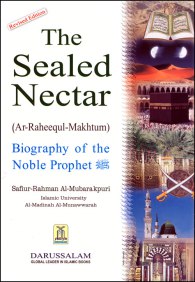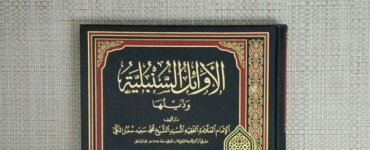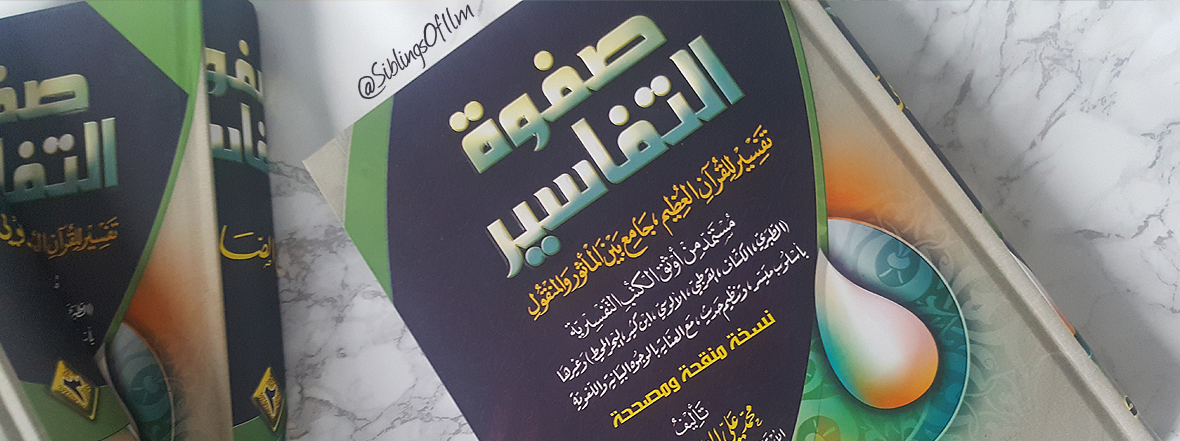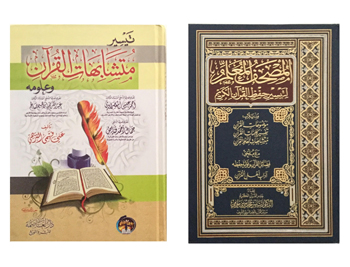Book Review: Khatm-e-Nubuwwat (Urdu)
Author: Muftī Muḥammad Shafīʿ (may Allah shower him with His mercy) (d. 1396/1976)
Reviewer: Mawlana Abu Asim Badrul Islam
Authored by one of the greatest masters of the Islamic sciences of the last century, and a magnificent spiritual master, Imam Mufti Muhammad Shafi’ (father of our masters, ‘Allamah Mufti Muhammad Taqi Usmani and Shaykh Mufti Muhammad Rafi’ Usmani), Khatm-e-Nubuwwat (The Finality of Prophethood) is a unique masterpiece. Comprising 406 pages, the 1419 (1998) edition that I have is the final and complete edition of this amazing and detailed enquiry into the concept of the finality of the prophethood of the Messenger of Allah, Muhammad (may the eternal peace and blessings of Allah be upon him). The book was completed by the author over a number of years and in three separate parts, which are preceded by two prefaces and an introduction – all by the author. The first preface is the later of the two – it is the preface to the fourth edition of the book and is dated by the author as 5th Jumada ‘l-Ula 1385 AH/1st September 1965 CE. This is followed by the preface to the first edition of the book and is longer, but has no date. This is then followed by a 19-page introduction, wherein the author further discusses the background to the book, having already discussed some of it briefly in the prefaces. The book is then divided into three parts. They are:
- Part One: Khatm al-Nubuwwah in the Qur’an (ختم النبوة في القرآن)
- Part Two: Khatm al-Nubuwwah in the Hadith (ختم النبوة في الحديث)
- Part Three: Khatm al-Nubuwwah in Athar (traditions of the Noble Companions of the Messenger of Allah, their successors and their successors – ختم النبوة في الآثار)
In the preface to the fourth edition, the author mentions that his first writing on the topic of finality of the prophethood of the Messenger of Allah, Muhammad (may the eternal peace and blessings of Allah be upon him) was a treatise entitled Hadiyyat al-Mahdiyyin fi Ayati Khatam al-Nabiyyin, which he wrote in Arabic, upon the instruction of his teacher, Hujjat al-Islam Mawlana Muhammad Anwar Shah Kashmiri, so that it could be distributed in Iraq, Egypt and other Arabic-speaking countries, where the Qadiyani fitnah was spreading to. This was published in 1342 AH/1924 CE from the Dar al-‘Ulum in Deoband, India (where both were senior professors at the time).
In 1343 AH/1925 CE, the author was requested by his teacher, Shaykh al-Islam Mawlana Shabbir Ahmad Uthmani and Mawlana Sayyid Murtada Hasan to write a more detailed book on this topic in Urdu. This work became Khatm-e-Nubuwwat (The Finality of Prophethood) and was first published in 1343 AH/1925 CE from Maktabah Dar al-Isha’at (Deoband, India).
The background to the book, and that which instigated the work, was the emergence of Ghulam Ahmad Qadiyani of Qadiyan, in the Punjab region of the then British India. Ghulam Qadiyani (also referred to as ‘Mirza’, and his followers ‘Mirza’is’ or ‘Qadiyanis’) started his public life as a common mulla or cleric. He then, gradually over a few phases, declared prophethood. However, this declaration and the true nature of the prophethood to which he was laying claim was very unclear, as the author examines in the introduction to the book. It appears that Ghulam Qadiyani himself could not decide precisely what type of prophethood he was declaring. It is no surprise, then, that till this day, his followers are confused and undecided as to what exactly their ‘prophet’ meant when he declared himself a prophet. This has contributed to the formation of the various factions and sects within the Qadiyani religion.
In the first part of the book, the author presents approximately 100 verses of the Holy Qur’an to establish, beyond any degree of doubt, the finality of the prophethood of the Messenger of Allah, Muhammad (may the eternal peace and blessings of Allah be upon him). In so doing, he presents the arguments of Ghulam Qadiyani and his followers, and refutes them one-by-one. The author, being a master exegete (mufassir) of the Holy Qur’an[1], gives an Urdu translation and offers a directly pertinent commentary after each of the Qur’anic verses.
In the second part of the book, the author presents 210 hadiths of the Messenger of Allah, Muhammad (may the eternal peace and blessings of Allah be upon him) to establish, beyond any degree of doubt, the finality of the prophethood of the Messenger of Allah, Muhammad (may the eternal peace and blessings of Allah be upon him). As with the approximately 100 verses of the Holy Qur’an in the first part of the book, the author gives an Urdu translation for every hadith and, where he deems necessary, a brief note.
In the third part of the book, the author presents the ijma’ (consensus) of the Muslim ummah on the issue of the finality of the prophethood of the Messenger of Allah, Muhammad (may the eternal peace and blessings of Allah be upon him), dozens of traditions from the Noble Companions of the Messenger of Allah, their successors and their successors, statements of the imams of ijtihad and jurisprudence, and evidences from the ‘ulama of Islam.
The book concludes with a direct heartfelt and sincere appeal by the author to the adherents of the Qadiyani religion and an addendum.
In one of his regular letters to his spiritual mentor, Imam Hakim al-Ummah Mawlana Muhammad Ashraf Ali Thanwi, the author mentions that the third part of his book Khatm-e-Nubuwwat (The Finality of Prophethood), which was remaining, has been printed and that he has sent a copy of the book to Imam Thanwi by post. He politely requests Imam Thanwi to have a look at the book and advise him of any necessary corrections or improvements. He also asks for a few lines from Imam Thanwi by way of a foreword. Imam Thanwi replies that he had intended to read a small portion from the beginning of the book and then write a foreword, but when he began reading it, he could not put it down. The more he read it, the more he enjoyed it, until he completed reading the entire book. Imam Thanwi then praises the book by stating how in-depth and comprehensive the research is. He says that when he read the confusing arguments of Ghulam Qadiyani and the responses from the author, he experienced the ecstasy of the knowledge of the Salaf (the Pious Predecessors).[2]
This book is truly a treasure trove for the student and scholar of Islamic theology, tafsῑr, ḥadῑth and fiqh. There are many books written on the subject of the finality of the prophethood of the Messenger of Allah, Muhammad (may the eternal peace and blessings of Allah be upon him) in Arabic and Urdu. There is, however, a dearth of detailed and high-quality literature on the subject in English. During his special visit to the United Kingdom in July 2018 to highlight the importance of the belief in the absolute finality of the prophethood of the Messenger of Allah, Muhammad (may the eternal peace and blessings of Allah be upon him), the illustrious successor to, and inheritor of the knowledge of, the author, our master, ῾Allāmah Mufti Muḥammad Taqi Usmani, spoke of the need to produce good quality literature on this subject in English[3]. If one of the more prestigious Islamic publishers in England took it upon themselves to translate Khatm-e-Nubuwwat (The Finality of Prophethood) to English, they will undoubtedly be filling a longstanding gap in the English Islamic library bookshelf and rendering a great service to Islam and the Muslims.
Abu Asim Badrul Islam
Northampton, ENGLAND
12 Ṣafar 1440/22 October 2018
Featured image: Front cover of Khatm-e-Nubuwwat (The Finality of Prophethood), 1419/1998 edition (Karachi).

[1] His huge commentary of the Holy Qur’an, Tafsir Ma’arif al-Qur’an, published in 8 very large volumes is undoubtedly the most popular and widely-read commentary of the Holy Qur’an in Urdu. It is read by the scholar and layman alike.
[2] The letter from Imam Mufti Muhammad Shafi’ is dated 10 Muharram 1346. The reply from Imam Hakim al-Ummah Mawlana Muhammad Ashraf Ali Thanwi is dated 15 Muharram 1346. (See: Makātῑb-e-Ḥakῑm al-Ummat Mawlānā Ashraf ῾Ali Thānwi banām-e-Ḥaḍrat Mawlānā Mufti Muḥammad Shafῑ῾ ṣāḥib – raḥmatullāhi ῾alayhi, Idārat al-Ma῾ārif (Karachi), 1416/1996)
[3] Audio recording by the author of this article of a special meeting attended by ῾ulamā in Stockwell, London on 10th July 2018.





